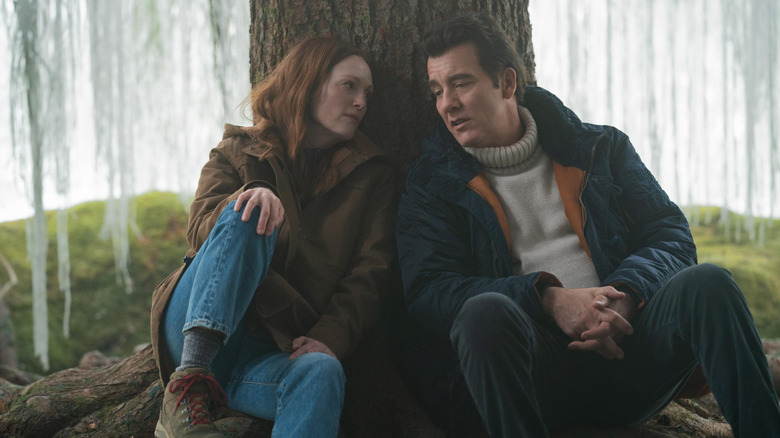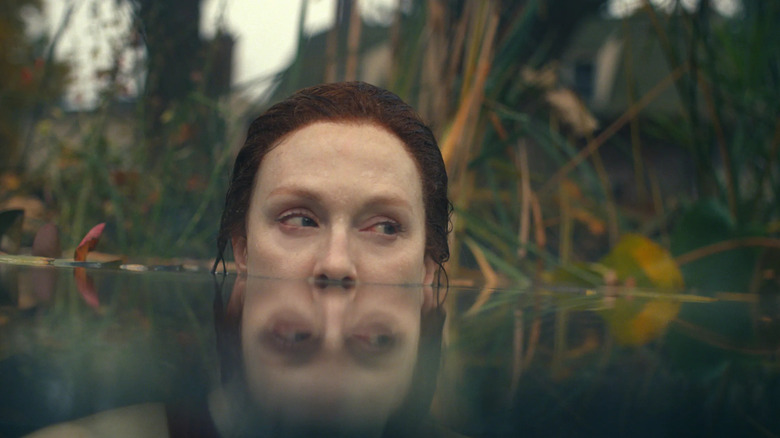Why Stephen King Didn't Let Anyone Else Write His Apple TV+ Series Lisey's Story
Stephen King has only occasionally written film or television adaptations of his own stories, including the 1989 "Pet Sematary" movie, the 1994 miniseries version of "The Stand," and the 2016 film "Cell" (which is King's lowest rated movie on Rotten Tomatoes). Be that as it may, King was adamant that only he would be allowed to adapt "Lisey's Story" for the small screen.
"Lisey's Story" is one of King's most unique books. It's not a horror tale as you would traditionally expect from King, but it is suspenseful. It's mainly a love story that spans decades of marriage between Lisey and Scott Landon: the petty fights, the romantic moments, the "Alice in Wonderland"-style language the couple invents, and the difficulties of sharing a life with a famous creative.
After his death, Lisey is left to sort through her husband's study. There, she comes across the nostalgic objects of their shared memories and his unfinished writing. She is also forced to deal with a stalker who is obsessed with Scott's work. Lisey then discovers her ability to retreat into a fantasy world that Scott left behind for her — a fairy-like kingdom called Boo'ya Moon, which is filled with lush flora, luminescent colors, and a literal wellspring of imagination.
The "Lisey's Story" miniseries premiered in 2021 on Apple TV+, as directed by Pablo Larraín and starring Julianne Moore, Clive Owen, and Jennifer Jason Leigh. /Film's spoiler review of the series, however, argues that King's insistence on writing "Lisey's Story" himself may have been its downfall. Indeed, despite its gorgeous, fantastical imagery and strong casting, the show often moves at a plodding pace and piles flashbacks upon flashbacks, killing the momentum. Much of the cringy baby talk between Lisey and Scott doesn't translate well to the screen either (to be fair, it's annoying to read, too). Still, it would've been difficult for King to fully give up creative control, seeing as "Lisey's Story" was incredibly personal to him.
Lisey's Story is based on Stephen King's own marriage and life as a famous author
King elaborated on his role behind-the-scenes on "Lisey's Story" during a 2021 interview with Entertainment Weekly. As he put it:
"I've always loved the story, and that's the reason I got involved. I held on to this one for myself because I thought at some point I would love to be involved with writing it and guiding it to completion, and to be able to do that is just a wonderful gift. Because at my age, you don't have a great deal of time — not to sound morbid or anything like that — it's just the actuarial tables."
"Lisey's Story" is so personal to King because, in many ways, it's his story. During a near-fatal pneumonia hospitalization in 2003, King's wife Tabitha deep-cleaned his office. When he returned home, he was shell-shocked to see his creative haven and personal repository had been completely overhauled. It felt like a vision of the future where he hadn't survived. This, in turn, inspired him to write about authors' legacies and the narratives we construct after our loved ones pass.
King likely wanted to avoid what happened with his other personal work, "The Shining," as he famously hated Stanley Kubrick's movie adaptation. He felt Jack Nicholson not only made the Jack Torrance character's evil transformation too obvious, but it also made the "evil" itself too pure. There was no nuance and no emotional arc for a man battling alcoholism in the film — something King had dealt with in his own life. Of course, Kind eventually got to tell the story he wanted by penning the 1997 "Shining" miniseries (which is worth watching).
"Lisey's Story," however, is a great example of how authors can be too close to their work and unable to see what will translate well onto the screen. Sadly, King's passion for this tale got lost in translation.

